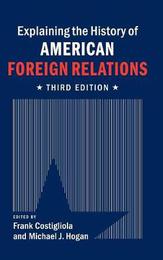
|
Explaining the History of American Foreign Relations
Hardback
Main Details
| Title |
Explaining the History of American Foreign Relations
|
| Authors and Contributors |
Edited by Frank Costigliola
|
|
Edited by Michael J. Hogan
|
| Physical Properties |
| Format:Hardback | | Pages:390 | | Dimensions(mm): Height 235,Width 157 |
|
| ISBN/Barcode |
9781107054189
|
| Classifications | Dewey:327.73009 |
|---|
| Audience | | Professional & Vocational | |
|---|
| Edition |
3rd Revised edition
|
| Illustrations |
5 Line drawings, unspecified
|
|
Publishing Details |
| Publisher |
Cambridge University Press
|
| Imprint |
Cambridge University Press
|
| Publication Date |
9 March 2016 |
| Publication Country |
United Kingdom
|
Description
A longtime classic in its first and second editions, Explaining the History of American Foreign Relations, 3rd edition presents substantially revised and new essays on traditional themes such as national security, corporatism, borderlands history, and international relations theory. The book also highlights such innovative conceptual approaches and analytical methods as computational analysis, symbolic borders, modernization and technopolitics, nationalism, non-state actors, domestic politics, exceptionalism, legal history, nation branding, gender, race, political economy, memory, psychology, emotions, and the senses. Each chapter is written by a highly respected scholar in the field, many of whom have risen to prominence since the second edition's publication. This collection is an indispensable volume for teachers and students in foreign relations history, international relations history, and political science. The essays are written in accessible, jargon-free prose, thus also making the book appropriate for general readers seeking an introduction to history and political science.
Author Biography
Frank Costigliola is a professor in the Department of History at the University of Connecticut. His books include Roosevelt's Lost Alliances, which won the Society for Historians of American Foreign Relations' Robert H. Ferrell prize for best book. He has received fellowships from the Institute for Advanced Study at Princeton, the National Endowment for the Humanities, the Guggenheim Foundation, the Norwegian Nobel Institute, and the University of Connecticut Humanities Institute. Michael J. Hogan is Distinguished Professor of History at the University of Illinois, Springfield. He is the author or editor of ten books, including Origins of the National Security State and the Legacy of Harry S. Truman, co-edited with Mary Ann Heiss. Hogan is also the recipient of the Beer Prize of the American Historical Association, the Wright Prize of the International Studies Association, and the Society for Historians of American Foreign Relations' Bernath Prize.
Reviews'The third edition of this very useful volume is a welcome sight.' Carol C. Chin, H-Diplo 'Historians of American foreign relations owe a debt of gratitude to the editors of the third volume of Explaining the History of American Foreign Relations and to the many scholars who contributed to the book. The collection admirably demonstrates the methodological and theoretical vibrancy of the field, and it does so by presenting cogent introductions to a wide array of interpretive approaches. Seasoned scholars and novices alike will benefit from the informed discussions of past and present perspectives, the rich historiographic treatments that inform articles, and the copious footnotes that guide readers to further scholarship.' Deborah Kisatsky, H-Diplo '... there is little doubt that Explaining deserves to remain among the very first books that incoming graduate cohorts read and discuss ... It serves well as an inspection of our field's toolbox - leaving up to the collective readership now and tomorrow to decide what it will be used to build.' Jason Parker, H-Diplo 'The Explaining the History of American Foreign Relations experiment, begun in 1991, remains a useful and unique work of scholarship - part reference work, part historiographical overview, part methodological primer, part history of the field as a whole - but more than just a 'state of the field' collection.' Molly M. Wood, H-Diplo
|